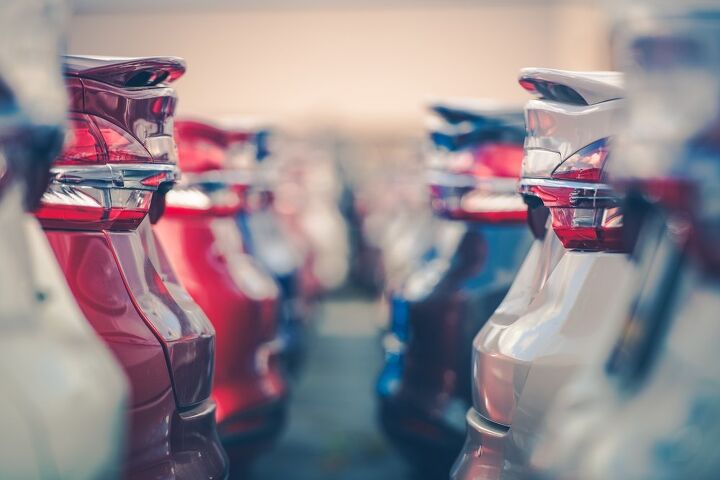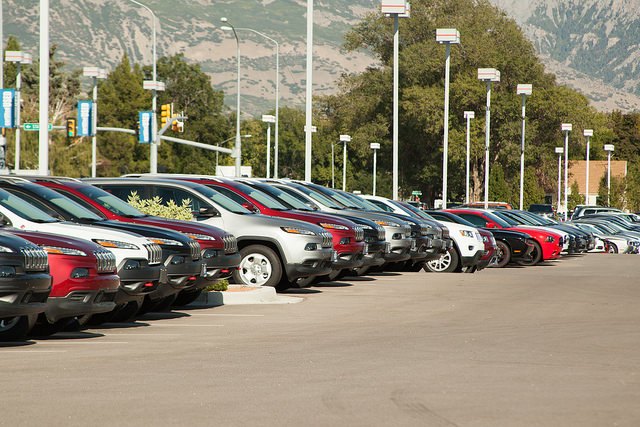#Loans
Auto Loan Delinquencies Reach Record Levels
Delinquencies on automotive loans have surpassed the recession-era highs witnessed in 2009, according to an assessment released by S&P Global Mobility on Monday. Fortunately the wealthy will be largely unaffected by this trend, as the issue is isolated primarily to subprime borrowers. For some strange reason, people with more money are having less trouble paying their bills on time.
Car Loan Delinquencies Keep Increasing, Who Is to Blame?
Not that you couldn’t have figured this one out all by yourself, but car loan delinquencies are reaching record levels once again. The culprits are the usual suspects. Wages have failed to keep pace with inflation for a couple of generations, current inflation rates are at record highs, and those loan-accommodation programs set up during the pandemic are all expiring now. Basically, regular people are becoming broke so they’re starting to be forced into tough financial decisions – including whether to make their car payments against heating their homes or feeding their families.
Pennsylvania Dealer Group Accused of PPP Fraud, Extorting Cash From Staff
When the United States announced it would be offering payroll relief to the countless small businesses it impacted with government shutdowns intended to combat COVID-19 earlier this year, everyone breathed a sigh of relief into their mask. Unfortunately, the Paycheck Protection Program (PPP) became a confusing bureaucratic mess almost instantly. It wasn’t clear how companies would account for part-time or contracted employees, numerous banks denied help to those with less than stellar financial histories, and the application website repeatedly crashed — which was awful for a service that was designed to accommodate candidates on a first-come-first-serve basis.
There were also numerous provisions that allowed big business to take advantage if their individual locations were small enough and loopholes for companies that weren’t even required to shut down operations. Criticisms understandably began to surface, followed by months of commercials asking concerned citizens to report instances of fraud. One such example came into focus this week after a former sales representative for a Pennsylvania-based dealership group launched a federal lawsuit against their ex-employer alleging that it had violated the False Claims Act in relation to PPP.
Hide Your Kicks, Hide Your Wife: Nissan's Credit Branch in Hot Water Over Illegal Repossessions
Nissan’s credit arm landed in some big trouble this week. It turned out that there are literally some rules around repossessing a car from a consumer. Apparently Nissan Motor Acceptance Corp. didn’t read those rules, and now they’ll have to pony up.
Report: Automotive Industry Borrows $132 Billion Through Pandemic
The automotive industry has borrowed an estimated $132 billion since the world started taking the coronavirus more seriously, according to a recent analysis by Bloomberg.
Despite migrating around the planet months before anyone thought to close down a single airport or suggest masks were necessary, March is broadly viewed as the start of the pandemic in the Western World, as that’s when most governments started taking direct action and businesses started looking for handouts. Still, it’s exceptionally difficult to follow the money if you didn’t devote yourself entirely to the task of tracking payments while under shelter-in-place orders.
We do know that a lot of money was being thrown around, however. Car dealerships were among the largest recipients of Paycheck Protection Program (PPP) funds in the United States, garnering anywhere from $7.5 billion to $12 billion in government aid to maintain staff. Plenty of criticism over exactly where that money went arose as the press questioned which businesses were more deserving and who was just taking advantage of the system.
But it’s only the tip of the iceberg. PPP funds don’t need to repaid unless they weren’t earmarked entirely for payroll purposes; the government also used the program to send over $600 billion to support banks in extending low-interest loans to companies during the pandemic. The automotive industry was one of the largest beneficiaries of that arrangement.
FCA Payday: Italy Readies $7.1 Billion for Automaker
Italy is on the cusp of approving a 6.3 billion-euro ($7.1 billion) loan for Fiat Chrysler Automobiles (FCA). Suppressed sales stemming from coronavirus lockdowns have encouraged governments around the globe to lend businesses a hand or — more accurately — fists full of money.
Bloomberg claims FCA’s payday will be Europe’s biggest government-backed financing of an automaker since the start of the pandemic, but it’s hardly the only company needing money. General Motors and Ford utilized credit lines to amass billions of dollars for their rainy day funds — and it’s definitely pouring outside. Ford figures it lost roughly $5 billion in operating costs in the three months leading up to June. Meanwhile, Fiat Chrysler estimates it lost $5.5 billion through the first quarter of this year.
Maintain Your Distance: Renault Sets Boundaries for the French Government
Renault finds itself reeling from pandemic-related shutdowns and industrial partnerships that proved more troublesome than helpful. Its alliance partner, Nissan, has been incredibly wary of any further integration with the French company — providing a major distraction within the alliance, even as the situation on the ground worsened. They’re now trying to reorganize the partnership while addressing the crippling financial situation they’ve both been confronted with.
Any talks of a merger (something Nissan clearly doesn’t want) have been suspended so the automakers can focus on reducing operating costs (layoffs, product reorganization, etc.). The duo also sought financial help to offset money lost back when we were all still collectively handling the pandemic in a super serious manner. While Nissan was interested in landing private loans, Renault hoped to get its aid via the French government. However, Chairman Jean-Dominique Senard made it clear that not all help will be welcomed, especially if it means nationalizing the company.
Wave a Solemn Goodbye to Cheap 84-month Loans, Shoppers
They’re still out there, just not in the same concentration as before. Two weeks after the U.S. auto industry restarted production in force, long-term, no-interest loans are becoming as hard to find as Lysol wipes.
At General Motors, which wooed many a truck buyer with zero-percent/84-month financing during the coronavirus lockdown, the good times seem to be over for buyers. However, some lucky individuals might be saved by timing.
Slashed Rates Factor High in Premium Push
As you read last week, the U.S. auto industry continues its climb out of the coronavirus ditch, with foreign automakers pushing back at a briefly dominant Detroit in a bid to restore sales sanity.
The domestic three managed to unload an awful lot of big-margin trucks during the lockdown, propelling scared customers into dealers with zero-interest financing on long-term loans. Detroit’s rivals have now fully caught on, fighting back with their own offers. For Lexus, the new proposal to buyers doesn’t even end at the new-car lot.
Small Business Administration Keeping Closer Tabs on Loan Forgiveness
With enhanced scrutiny and plenty of differing opinions being heaped upon the government loans issued to help soften the economic impact of the coronavirus pandemic, the Small Business Administration (SBA) has signaled plans to conduct comprehensive investigations before offering any loan forgiveness. Under normal circumstances, one would expect that to be the typical course of action for all loans. But the scope of the Paycheck Protection Program (PPP) has complicated things.
Designed to provide a direct incentive for small businesses to keep workers on the payroll, the program earned heaps of criticism after millions of dollars were allocated to groups that didn’t exactly constitute small businesses. While the list is long, standouts include the Los Angles Lakers and Ruth’s Hospitality Group. We’re more interested in the United States’ largest new-vehicle retailers, AutoNation and Penske Automotive — both of which received millions via the SBA’s Paycheck Protection Program.
Not Everyone Drove Away With a Low-interest Loan in March
We told you yesterday how zero-interest financing exploded in popularity in the final two weeks of March, as governments everywhere belatedly clamped down and automakers had to pull out all the stops to lure frightened buyers out of their homes. Despite many would-be buyers not taking the bait, for some, zero-percent/84-month loans proved as irresistible as topless pics of a young starlet on the beach.
At the same time, drivers who stood no chance of netting that coveted no-interest loan were also headed to dealers.
Fresh Lordstown Product Bound for Detroit
No, General Motors hasn’t snatched back its mothballed Lordstown, Ohio assembly plant and restarted production of the Chevrolet Cruze. Clearly, those angry letters from yours truly fell on deaf ears.
Instead, the plant’s new owner, Lordstown Motors, will reveal the model it hopes to build at the former GM site at this summer’s Detroit auto show. Before homegrown electric pickups can roll out of the plant, however, Lordstown first needs cash.
That’s where the feds come in.
The Cost of Ownership: Financing a Car Hasn't Gotten Any Cheaper, Says AAA
The American Automobile Association (AAA) suggests that long-term loans are encouraging ownership costs of new vehicles to climb. In some instances, the group suggests customers could be on the hook for well over $10,000 per year. While this only applies to larger and more expensive automobiles, AAA says the trend is all-encompassing — spurred largely by changing finance conditions.
According to AAA’s latest research, finance costs on new vehicle purchases have jumped 24 percent in 2019, elevating the average annual cost of car ownership to $9,282 ($773.50 per month).
“Finance costs accounted for more than 40 [percent] of the total increase in average vehicle ownership costs,” elaborated John Nielsen, AAA’s managing director for Automotive Engineering & Repair. “AAA found finance charges rose more sharply in the last 12 months than any major expense associated with owning a vehicle.”
As Interest Rates and New Vehicle Prices Rise, Loan Terms and Payments Reach for the Sky
Image, for a moment, that the trailer pictured above is filled with debt. It’s a good representation of the average new vehicle purchase.
Looking at last month’s stats, you’d have to go back to the safe and comfortable pre-Twitter era to find a January in which fewer people got their hands on a zero percent new vehicle loan. January 2006, to be exact.
Last month wasn’t just a departure from a decade past — the car buying landscape appeared quite different just a year ago, all thanks to rising interest rates and the perpetual upward creep of new car pricing. Data from Edmunds helps break down the differences.
Suffice it to say you’re likely paying a lot more, but you’re spreading it out over a longer term.
Subprime Car Buyers Haven't Defaulted This Much Since '96
Grunge was on its way out the door, Pepsi aficionado Bob Dole was challenging William Jefferson Clinton for the keys to the White House, and the Ford Contour was still a relatively new sight on American roads.
That was the last time this many U.S. car owners fell way, way behind on their subprime auto loans.






























Recent Comments